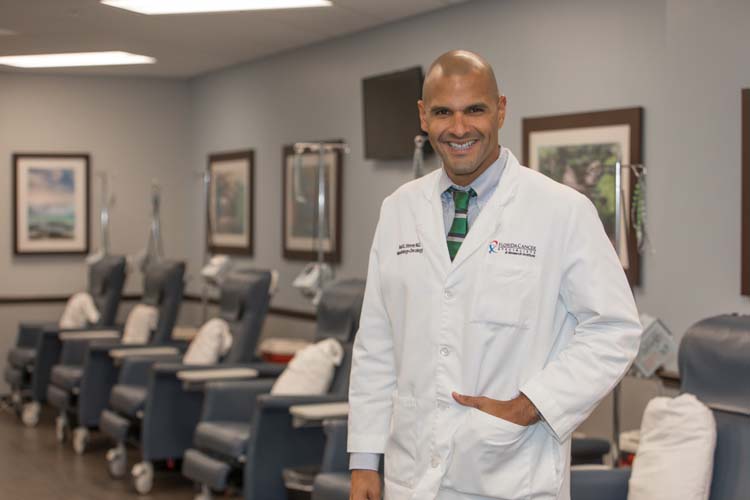The debate going on in the medical community about whether prostate-specific antigen (PSA) screening reduces the risk of death from prostate cancer has no easy or clear-cut answer, according to Dr. Raul Storey, a medical oncologist affiliated with Sebastian River Medical Center.
PSA screening, well-known to men of a certain age, is the most common method used to diagnose prostate cancer. It assesses the levels of an antigen (a protein) produced by the cells in the prostate gland; the levels are expressed as “nanograms per milliliter.”
However, PSA tests can yield “false positive” results, as there are health conditions other than prostate cancer that can raise a man’s PSA levels – including an enlarged or infected prostate and the presence of a urinary tract infection. In light of this, the United States Preventive Services Task Force (USPSTF) states that “there is convincing evidence that PSA-based screening for prostate cancer results in considerable overtreatment and its associated harms.”
The Task Force actually goes one step further, recommending against PSA-based screening, saying that existing studies have demonstrated only a “very small” decrease in deaths from prostate cancer as a result of the test.
However, a new review, conducted by researchers from the Fred Hutchinson Cancer Research Center in Seattle, concludes that PSA screening is in fact linked with a considerable reduction in the risk of prostate cancer death, and suggests that the Task Force guidelines may need to be reviewed.
The researchers, led by Ruth Etzioni, Ph.D., recently reported their results in the Annals of Internal Medicine. They re-examined the two studies on which the Task Force guidelines were based, using a mathematical model to account for differences in how each study was conducted. In doing so, Etzioni and her colleagues found that both studies demonstrated evidence of a significant reduction in prostate cancer death as a result of PSA screening.
Back to Sebastian’s Dr. Storey. He says whether or not to screen for PSA levels is a controversial and complicated topic, and suggests the research out of Seattle may be somewhat oversimplified, saying, “if a screening test shows a high PSA level, additional tests are done, which are not without risk and side effects, and can cause anxiety. And not every case of prostate cancer is the same. Some are slow-growing and some are aggressive. So the life expectancy of the man, based on his age and overall health, has to be taken into account.”
One thing that is clear is the association between PSA levels and the risk of developing prostate cancer. Dr. Storey says “men with a PSA level under 4 have a 15 percent chance of developing prostate cancer in the next 10 years. That percentage goes up to 30 or 35 percent if the PSA level is between 4 and 10, and 67 percent if the PSA level is over 10.” And a PSA test may help detect prostate cancer at an early stage, when it’s easier to treat and more likely to be cured.
Dr. Storey says that some studies have shown that men over 70 do not reduce their risk of dying from prostate cancer by getting their PSA levels tested. But, in keeping with the complexity of this issue, he stresses that this is not a definite conclusion.
While the Mayo Clinic has not weighed in on this debate, it does provide notes of caution about the reliability of PSA testing. In addition to the false positives that lead to further testing and (perhaps) unnecessary treatment, the Mayo Clinic website states that between 23 percent and 42 percent of men with prostate cancer detected by PSA tests have tumors that wouldn’t result in symptoms during their lifetimes. These men are considered to be “overdiagnosed”; having cancer that’s not likely to cause poor health or to present a risk of death.
The message Dr. Storey wants to share with the men of our community is this: “There is no specific recommendation about PSA screening that will apply to all men. There are too many variables for that to be possible. It is important that men over the age of 50 have a discussion with their primary care physician or urologist about whether PSA screening is right for them, based on their individual circumstances.”
Dr. Storey’s private practice is part of Florida Cancer Specialists, with locations at 1880 37th St. in Vero Beach: 772-589-0879; and 13060 U.S. 1, Suite A, in Sebastian: 772-228-3381.

